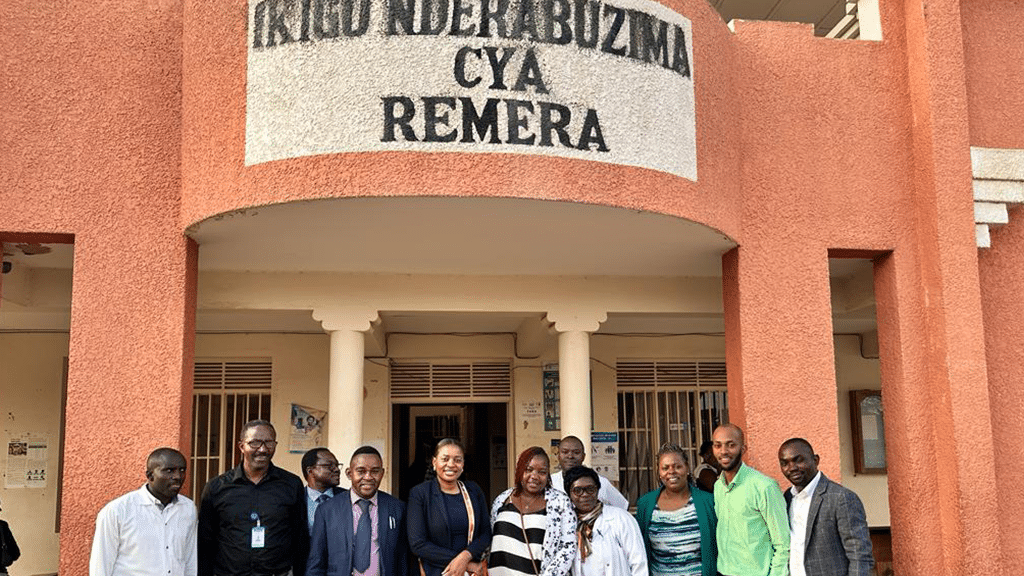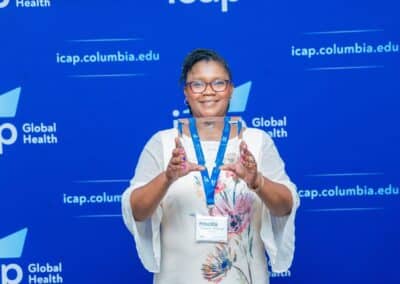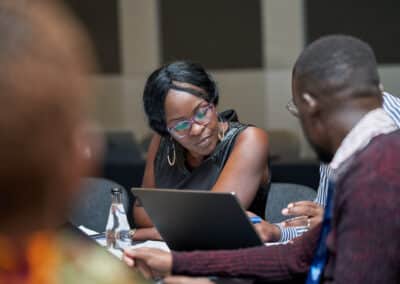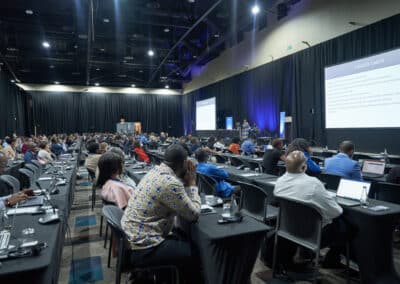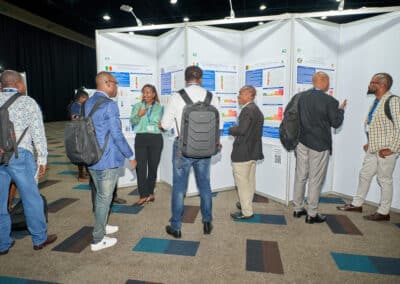“The visit to Rwanda was a unique learning experience,” said Peter Nwaokenneya, assistant director for Adult ART, TB/HIV Treatment, Care, and Support for the Nigeria National AIDS and STI Control Program. “All the participating countries were involved in planning and creating shared objectives and expectations for learning,” he added.
“As the visiting country, we also shared details of our family planning and HIV models and participated in daily debriefs, where we submitted reports from our field visit observations,” said Sindy Matse, acting program manager with the Eswatini National AIDS Control Program. “This new approach for a country visit allowed us to have deep discussions and reflections on our family planning integration programs. We were able to share what we can introduce or improve in our respective countries,” said Matse reflecting on the CQUIN-supported learning visit to Rwanda on family planning integration into differentiated HIV treatment programs.
From July 10 to 14, 2023, CQUIN supported the learning visit to Rwanda for a 14-member delegation, including members of the Nigeria and Eswatini Ministries of Health and National Networks of People Living with HIV. The visit aimed to foster discussions, identify best practices, and co-create resources to support the integration of family planning (FP) and HIV programs.
“The unique challenge of FP/HIV integration motivated the ICAP CQUIN team to develop what we are calling enhanced country-to-country learning exchange visits,” said Maureen Syowai, MBChB, MSc, CQUIN deputy director (Technical). “Given the shared challenges amongst all CQUIN network countries, we designed a deep exchange of best practices between the host and visiting countries, and unlike our usual country-to-country visits where the host country runs the show, we supported all three countries to describe their programs and best practices around family planning integration into HIV treatment programs,” Dr. Syowai said.
For the enhanced country-to-country visits, CQUIN organized several debrief sessions for all the country teams to exchange ideas and participate in guided discussions on FP/HIV integration before and after field visits organized by the Rwanda Biomedical Center, the Rwanda Ministry of Health’s implementation agency.
-
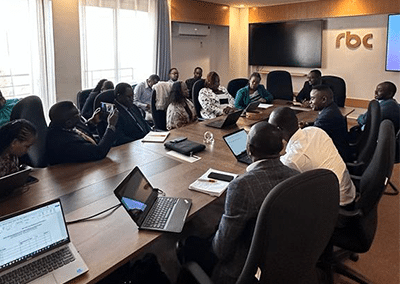
Learning visit delegation in a presentation session at the Rwanda Biomedical Center
-
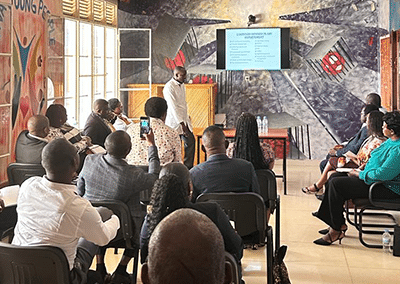
Delegation at the Kabuga Youth Empowerment Center
Field visits included a tour of the Remera Health Center, where women receive antiretroviral treatment (ART) at the HIV clinic and reproductive health services at the FP clinic, and Gahanga Health Center, which provides a one-stop-shop approach in which HIV service providers are trained to offer both FP and ART services in the HIV clinic. At Rwanda’s Kabuga Youth Empowerment for Global Opportunity Center, one of 32 youth centers in Rwanda that offers reproductive health services, the delegation visited a private room with a dedicated nurse provider offering integrated HIV and FP services.
“We were highly impressed by Rwanda’s sustained integration of FP services into the ART clinics. We observed many innovations. The availability of the one-stop-shop model for FP and ART services helped to reduce waiting times at the health center and reduce lost-to-follow-up clients. As a country team, we plan to update our current DSD models in line with emerging FP issues and implement many activities that will improve Nigeria’s MCH and FP domains,” said Dr. Nwaokenneya.
Even though Rwanda’s national HIV policies support FP/HIV integration, a 2022 country self-assessment using CQUIN’s Capability Maturity Model for HIV treatment showed the country achieved less than 50 percent of its national FP coverage targets for women living with HIV. Data from Rwanda also indicates that 14 percent of all women of childbearing potential in Rwanda still need access to FP services.
“We have a lot more to do. For one, we know that diverse integrated models tailored to recipient of care contexts, as well as the availability of several FP methods, increases the uptake of FP services, so if we invest in securing a variety of modern contraceptive methods, the uptake of FP services would increase,” said Brian Kwizera, MBChB, DSD advisor for Rwanda.
According to Dr. Syowai, the sustainability of integrating non-HIV programs into DSD models requires seamless coordination at national levels between the two programs at all the different levels of service delivery. “We have seen that when implementing partners support DSD implementation at the facility level, it works, but then there is a breakdown in service provision as soon as they leave. We hope to support countries to ensure there is always coordination at the national level to provide the oversight and guidance that will lead countries to sustain their HIV programs.”
CQUIN will support at least two more enhanced visits on FP/HIV integration. Cameroon and Kenya will visit Rwanda, while Mozambique will host Ghana and Uganda as CQUIN continues to prioritize its stream of work on the integration of FP, TB, and non-communicable disease (NCD) services into DSD programs.
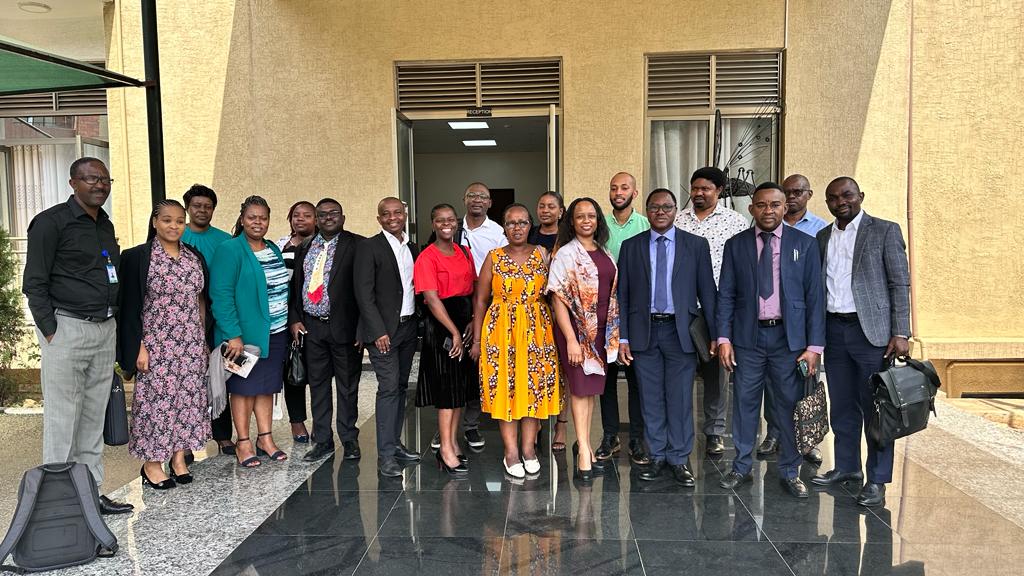
Members of the Nigeria, Eswatini, and Rwanda Ministries of Health and National Networks of People Living with HV and CQUIN staff.


